Email marketing, by no mistake, is still one of the most effective ways to build relationships with customers, nurture leads, and drive consistent revenue.
But to make the most of it, you need the right platform — one that fits your business goals and scales with your growth. A while back, we looked at the best customer service tools for strengthening support and communication; this time, we’re turning our attention to email marketing tools, which are just as essential for keeping your audience engaged and converting.
When choosing an email marketing platform for your business, it can be challenging to identify one that fully meets your needs. Many of them offer a drag-and-drop builder, personalization, segmentation, and other essential features. In this comparison, we‘ll provide you with the best tools we found on Capterra and G2 in terms of pricing, usability, and features. Here are our top 10 email marketing services to help you communicate with your customers properly.
SendPulse
SendPulse is an all-in-one marketing automation platform launched in 2015, and it currently powers campaigns for over 3 million users worldwide. What makes it unique is its versatility: alongside a feature-rich email marketing suite, SendPulse provides tools for SMS and chatbots. It also includes a CRM, landing page, and website builder, and even online store creation—all connected under one platform. This makes it especially attractive for businesses that want to manage everything in one place rather than piecing together multiple tools.
When it comes to email, SendPulse shines with its visual drag-and-drop builder and a wide selection of professional templates. The built-in AI assistant helps refine subject lines and body text, ensuring polished, error-free copy. Beyond email, the AI content generator can craft and optimize website or landing page text, letting you translate, rewrite, summarize, or simplify content to match your target audience.
- Strong multi-channel features: email, SMS/MMS, web push, and chatbot campaigns are all available. This allows you to engage customers across channels without additional subscriptions.
- Powerful visual automation engine with triggers for on-site events, email opens, and more. You can build email+SMS sequences and integrate the CRM for sales pipeline workflows.
- Intuitive drag-and-drop editor for emails and push messages, with a gallery of responsive templates.
- Library of 130+ pre-built free email templates;
- A/B testing and segmentation features help personalize campaigns.
- Fixed and dynamic segments (e.g., by subscriber activity or custom fields), so you can target audiences precisely. Basic personalization (names, custom fields) is built in.
- 24/7 support in multiple languages across various marketing channels.
- Mobile apps for iOS/Android, multi-user teamwork features, and an email verifier tool for list cleaning.
Its free plan allows you to send 15,000 emails to 500 subscribers, and make 100 verifications with the email verifier. The platform’s paid plans start at around $5.30 per month for 500 subscribers, offering unlimited emails, full A/B testing, and other perks.
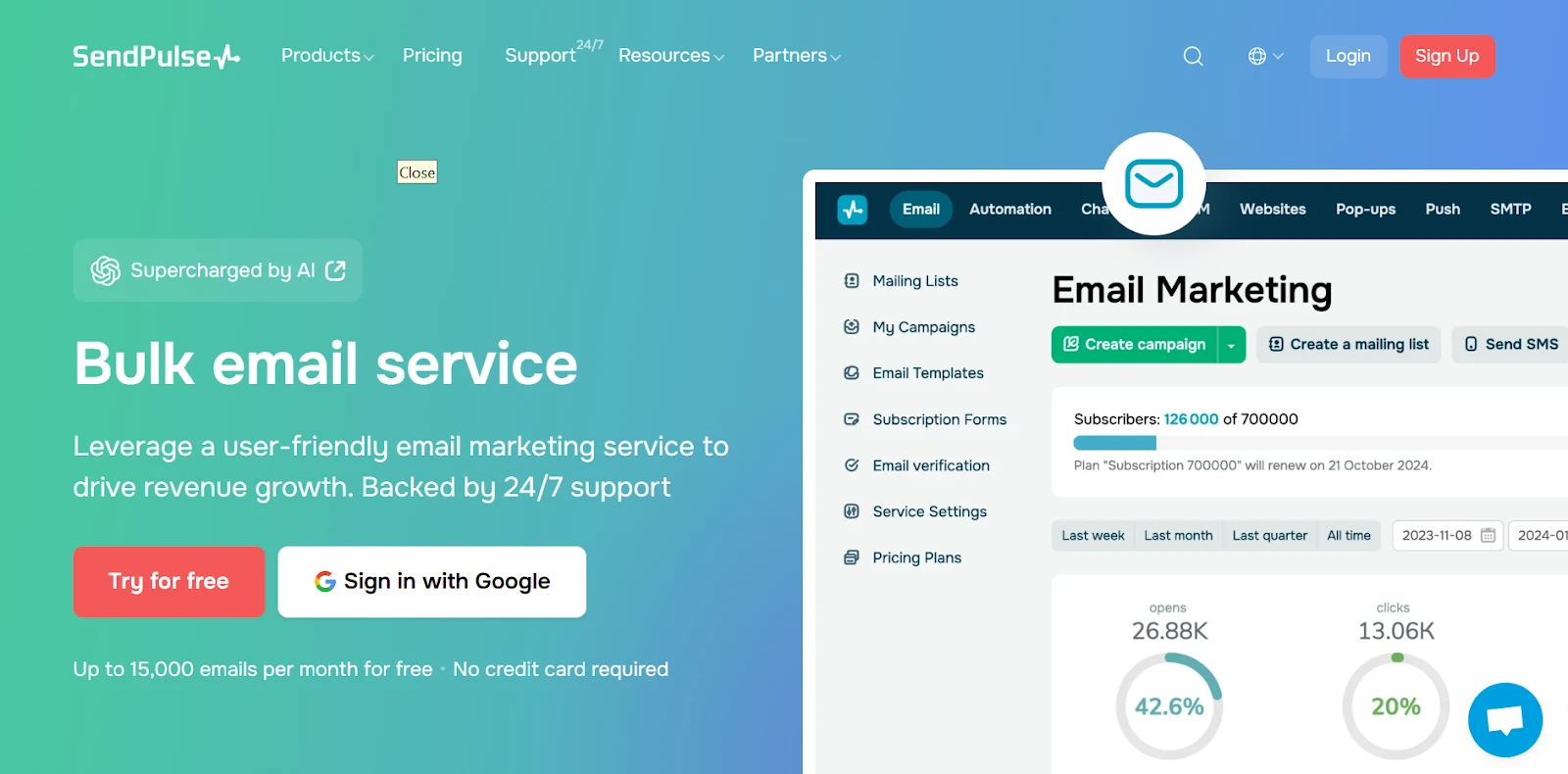
Best for: Agile small businesses and agencies needing an affordable multichannel marketing suite under one roof. SendPulse’s standout USP is that it allows you to manage email, SMS, push notifications, and chatbots all in one place – even on the free tier.
Mailmodo
Mailmodo is an AI-powered email marketing software that helps you create, automate, and optimize campaigns effortlessly. From planning strategy to writing copy and building journeys, Mailmodo’s AI Agents handle it all, with no technical expertise needed. It’s the fastest way to send smart, interactive, and high-performing emails.
The AI-Powered Email Builder allows users to create on-brand, polished email designs in seconds, easily remixing layouts, colors, and content through AI commands. For hands-on customization, the drag-and-drop editor ensures complete design control with live previews for quality assurance.
Key Features:
- AI Email Assistant: Generate strategies, subject lines, and copy ideas instantly through chat-based AI.
- Interactive AMP Emails: Add forms, polls, surveys, and product showcases directly inside emails.
- AI-Powered Builder: Create or remix polished, on-brand emails in seconds using AI commands.
- Smart Automation: Get AI-suggested workflows with editable triggers and templates.
- AI Audience Segmentation: Describe your target group, and AI automatically builds precise, ready-to-use segments.
Pricing
It has a forever free plan with limited features, The Lite plan costs $39 per month (billed annually) and provides 20,000 credits. The Pro plan is $79 per month with 25,000 credits, and the Max plan costs $159 per month and offers 37,500 credits.
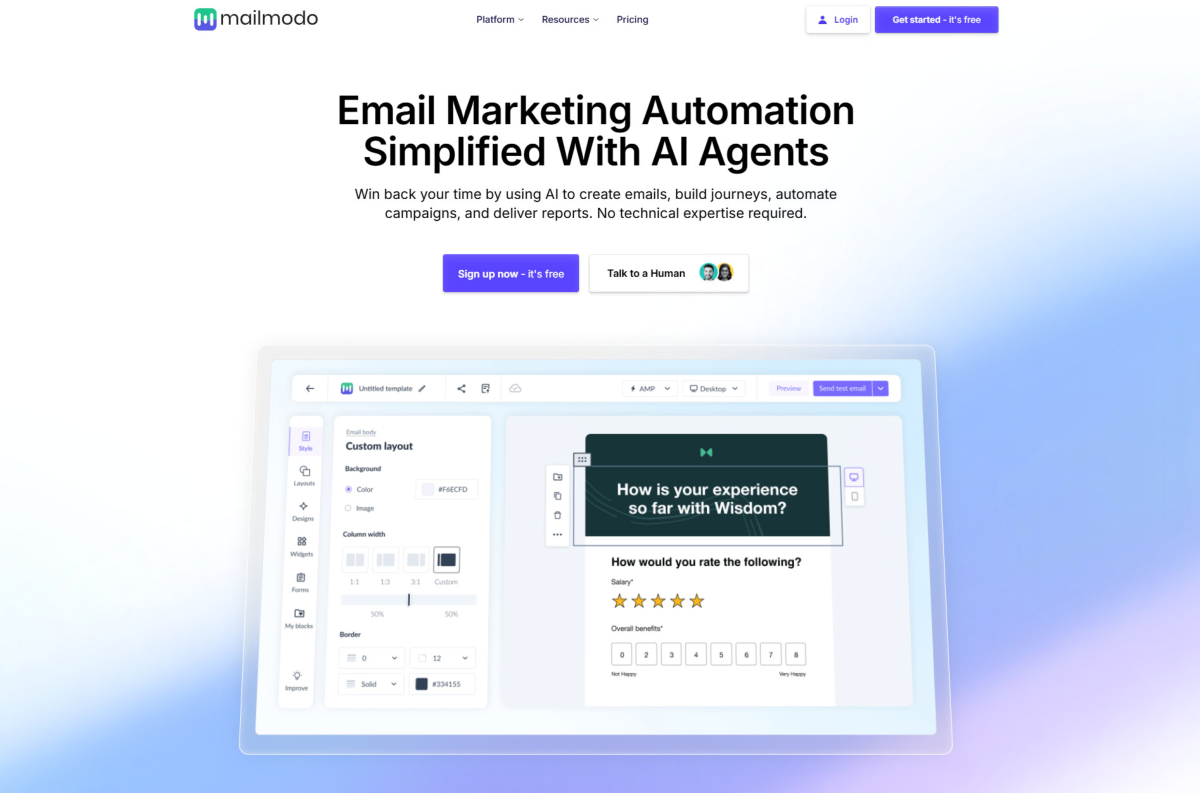
Best for: A complete AI-powered email platform with AMP technology that helps SaaS businesses, marketers, and startups build and automate smarter campaigns.
Salesforce
Salesforce’s Email Marketing Platform uses AI automation to help businesses create more personalized and relevant email campaigns. Since it connects directly to Salesforce CRM, the platform can pull in your existing customer data and use it to tailor each message automatically. This makes it easy to adjust email content based on things like demographics, past interactions, and behavior.
The platform also has a strong A/B testing feature that lets you track how your emails are performing in real time. From these tests, you’ll get clear reports that show what’s working and how you can improve.
- Supports email and SMS campaigns, and works directly with your CRM so all your customer data is ready to use.
- Easy drag-and-drop email builder with built-in templates, dynamic content, and AI suggestions.
- Advanced automation tools that let you build multi-step workflows with triggered messages and behavior-based flows.
- Detailed segmentation that uses CRM data, custom fields, and engagement history to help you personalize your emails.
Although the platform doesn’t offer a free tier, Salesforce provides a 30-day trial to test its features. Pricing starts at US $2,000/month, which is higher than most options, but you’re paying for stronger automation, CRM integration, and AI-powered personalization.
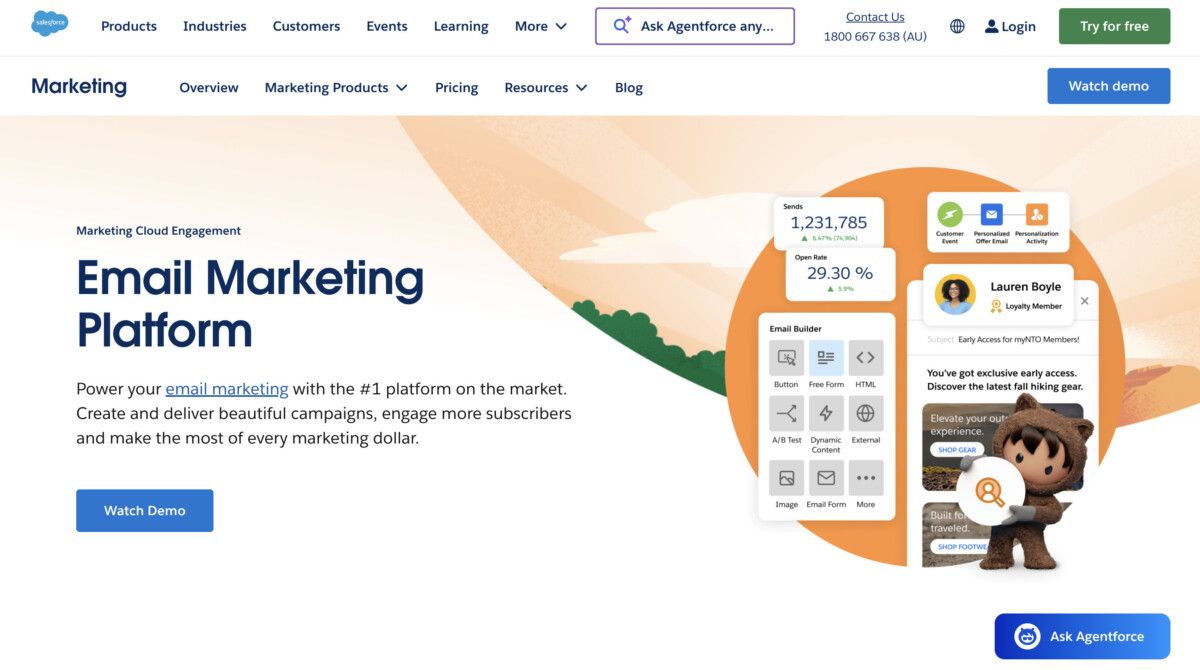
Best for: Mid-to-large businesses or marketing teams who already use Salesforce CRM and need an email marketing platform that offers AI-powered personalization and deep customer-data integration.
Mailchimp
Mailchimp is arguably the most famous email marketing platform. Founded in 2001 and now owned by Intuit, Mailchimp serves millions of customers’s marketed as a one-stop marketing automation platform for growing businesses, offering email, landing pages, social ads, and CRM tools. Mailchimp’s strength lies in its ease of use, featuring a polished drag-and-drop editor, a vast template library, and helpful AI recommendations. It has evolved well beyond email into full marketing suites.
- Primarily email-focused, though Mailchimp has added SMS marketing and CRM features (especially after the Intuit takeover). It does not offer browser push or chatbots.
- Strong automation with pre-built workflows (welcome series, cart abandonment, date-based triggers). Includes conditional logic for splits, send time optimization, and integration with ads.
- A highly flexible email builder featuring hundreds of pre-designed templates and a comprehensive stock image library. Newer AI tools help generate content and suggest improvements.
- Basic and advanced segmentation (e.g., by engagement or purchase history) and dynamic content blocks. Smart recommendations show key audience segments.
On the flip side, its free plan is limited (500 contacts, 1,000 sends), and it can be pricier as lists grow. The price for paid plans starts at $13 monthly for 500 contacts, 10X contacts email sends, and 3 audiences.
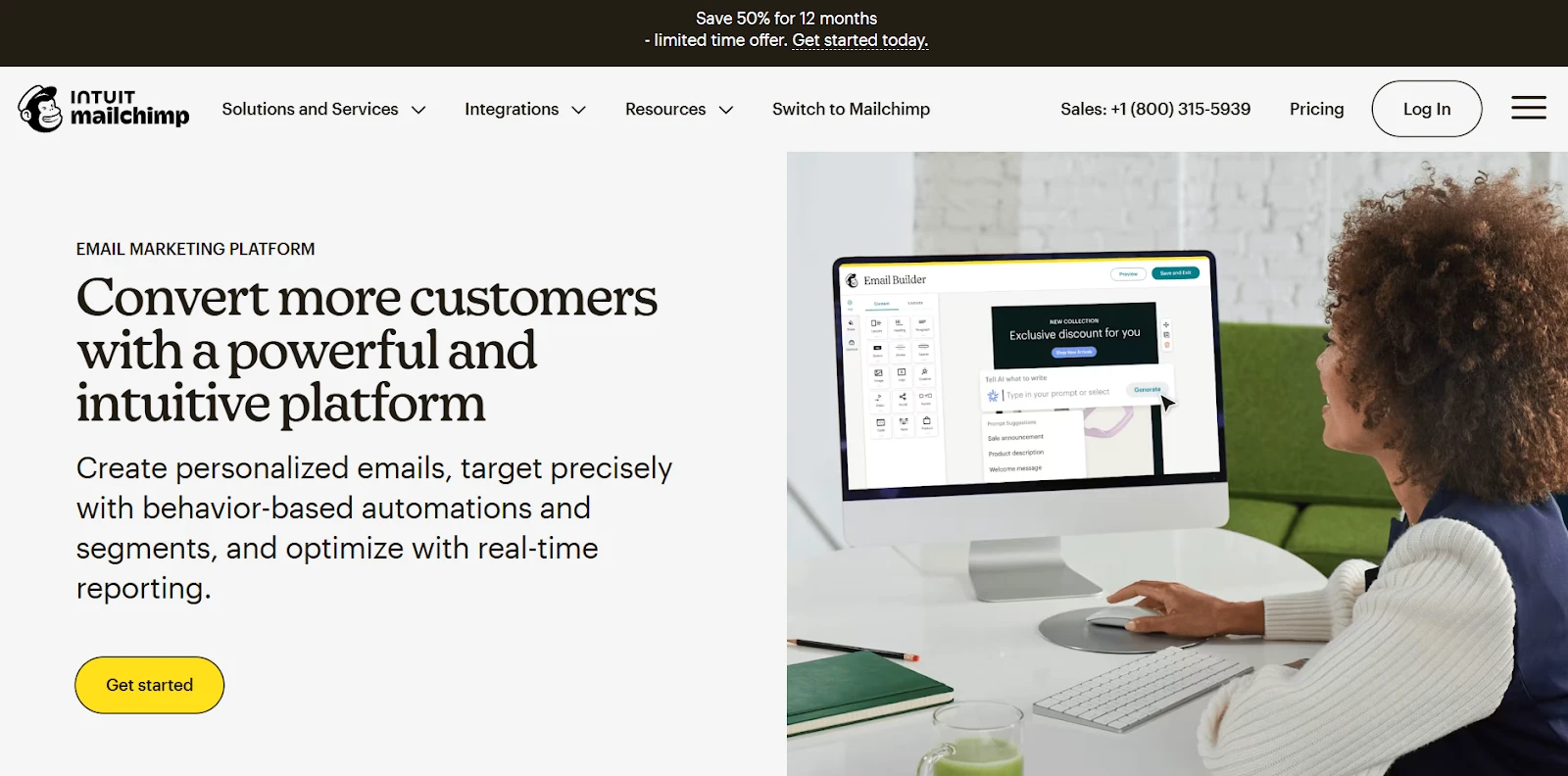
Best for: Entrepreneurs and marketers who want a familiar, user-friendly all-in-one marketing platform. Mailchimp’s USP is its polished interface and comprehensive feature set, which caters to both beginners and intermediate users, covering email, basic CRM, and more in one place.
Constant Contact
Constant Contact is an email and digital marketing tool aimed at small businesses, nonprofits, and event organizers. Its tagline is “Email marketing, made easy,” and it has millions of users who appreciate its straightforward approach. Notably, Constant Contact offers built-in event marketing, donation collection, and social media tools, reflecting its roots serving community organizations and franchises.
While it doesn’t offer a free tier (only a 60-day trial), it stands out for its supportive customer service and marketing guides. Critics say it’s more basic than some newer tools, but it excels at simple email campaigns, list-building, and helping non-technical users get started.
- Primarily email and SMS marketing (SMS campaigns are available). No web push or chatbots. Also offers social media posting and basic ad integration.
- Basic autoresponders (welcome emails, birthdays) and email scheduling are available. It lacks advanced multi-step visual automations, focusing instead on simplicity.
- Hundreds of industry-specific email templates and a user-friendly drag-and-drop editor. A strong point is the “Eventbrite integration” for easy event invites and RSVPs.
- List segmentation by tags and behaviors (opens, clicks). Offers coupon and survey tools to engage contacts. Personalization is available via merge tags.
Although the platform does not offer a free plan, it still allows marketers to enjoy a free trial. The price for paid plans starts at $12 monthly for 10x your number of contacts email sends.
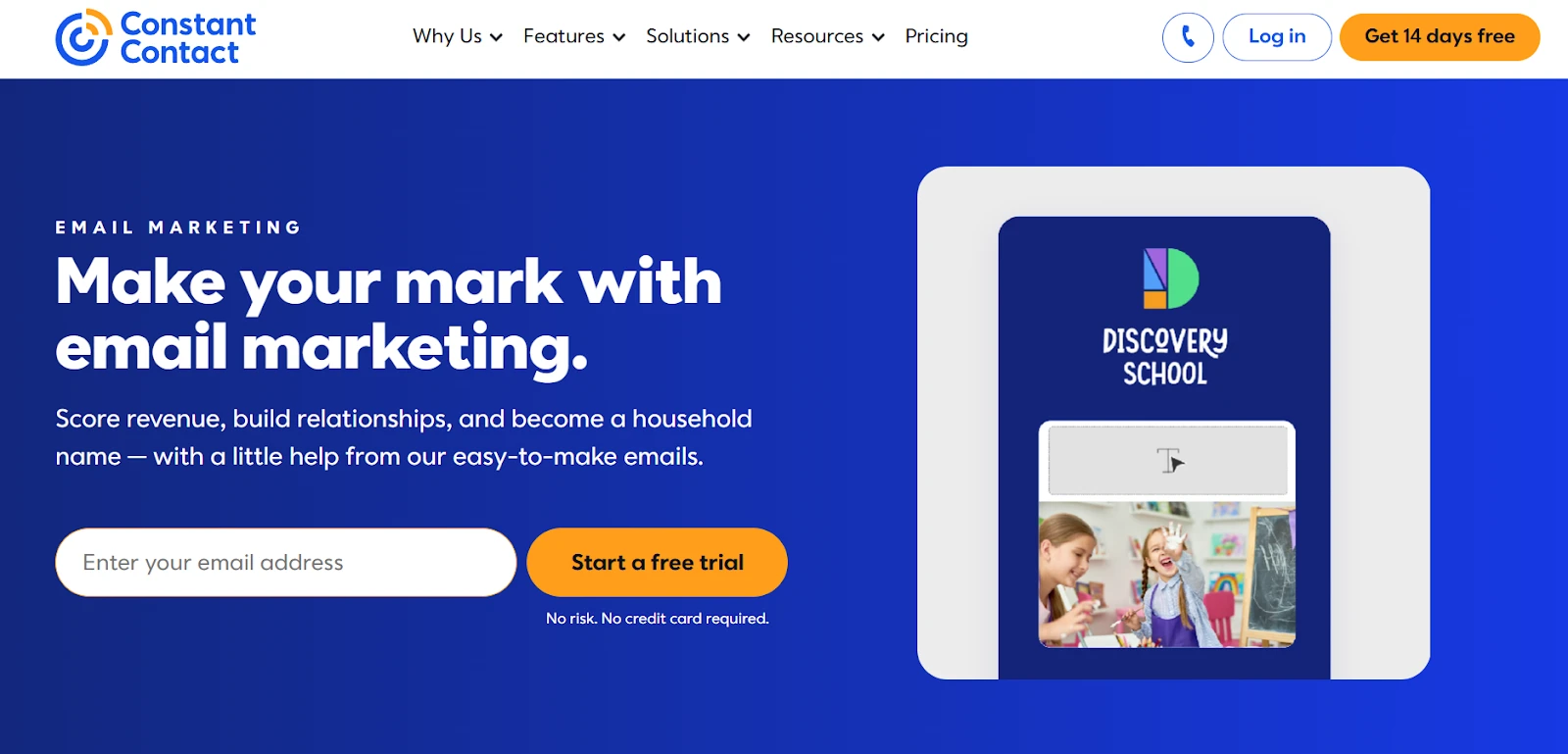
Best for: Small businesses and organizations seeking a no-fuss email/event marketing solution. Constant Contact’s USP is its ease of use and specialized tools for event invites and communities, making email campaigns straightforward even for beginners.
Brevo (formerly Sendinblue)
Brevo (the rebranded Sendinblue) is an all-in-one marketing platform with a strong emphasis on automation and AI. It combines email, SMS, WhatsApp, and live chat in one interface. The company highlights an “AI-enabled platform” and claims 500,000+ customers worldwide.
Key strengths include its AI content generators (Aura AI) and sophisticated automation workflows. Its visual workflow builder allows complex multi-step campaigns, and it even incorporates AI agents for content creation and send-time optimization. In short, Brevo tries to be a budget-friendly alternative to big names like HubSpot, and many users say it “saved us $30K annually compared to HubSpot”.
- Omnichannel automations (send an SMS or WhatsApp message as part of a workflow).
- Advanced automation with conditional splits, list management, and AI-powered recommendations. The visual “Marketing Automation” canvas is robust, supporting complex branching sequences.
- Modern drag-drop email builder with responsive templates, plus landing page and signup form builders. Allows A/B testing of subject lines and content.
- Flexible segmentation (behavioral triggers, list tags, geolocation, etc.) and dynamic content for personalization. The “send at best time” feature optimizes email scheduling for each contact.
Brevo’s free plan is generous with contacts (unlimited), although it caps at 300 emails/day, which is unusual yet beneficial for businesses that send frequent, low-volume emails. For businesses that require sending more emails, a paid plan is necessary. The cheapest option will cost $9 per month for 5,000 emails, with no daily sending limit, basic reporting, and analytics.
Best for: Growing businesses that want AI-enhanced multichannel marketing on a budget. Brevo’s USP is its integrated multi-channel toolkit (email + SMS/WhatsApp + live chat) and AI-powered features, enabling advanced automation without the HubSpot price tag.
ActiveCampaign
ActiveCampaign is a robust platform renowned for its advanced automation and CRM capabilities. It combines email marketing with a built-in sales CRM and messaging (including new channels like WhatsApp and SMS). Over 180,000 businesses use it as a central marketing hub. Unlike simpler tools, ActiveCampaign caters to businesses ready for sophisticated segmentation and analytics. It touts AI-powered “agents” that can create and adapt campaigns, and excels at orchestrating multichannel funnels.
ActiveCampaign’s email designer is solid (though not the best), but its greatest strength lies in logic-driven workflows, including conditional splits, predictive sending, lead scoring, and CRM-driven automations. The trade-off is a steeper learning curve and higher cost. However, if you need enterprise-style automation without migrating to a large platform, ActiveCampaign shines.
- True visual “automation builder” with dozens of triggers/actions. Automations can include triggers from site visits, purchases, form completions, etc.
- Built-in CRM and predictive actions (lead scoring, win probability) tie marketing and sales together.
- Dozens of pre-set email templates. Not as many flashy templates as Mailchimp, but functional and customizable.
- A/B testing (including up to five variants) is supported.
- Very advanced segmentation (every field, behavior, and tag can be a segment). Personalization tags, dynamic content, and predictive sending (“send when best”) help tailor campaigns precisely.
The service does not offer a free plan, but marketers are provided with a free trial to test the features. The price for paid plans starts at $15 monthly for 1,000 contacts and 10x contact limit email sends.
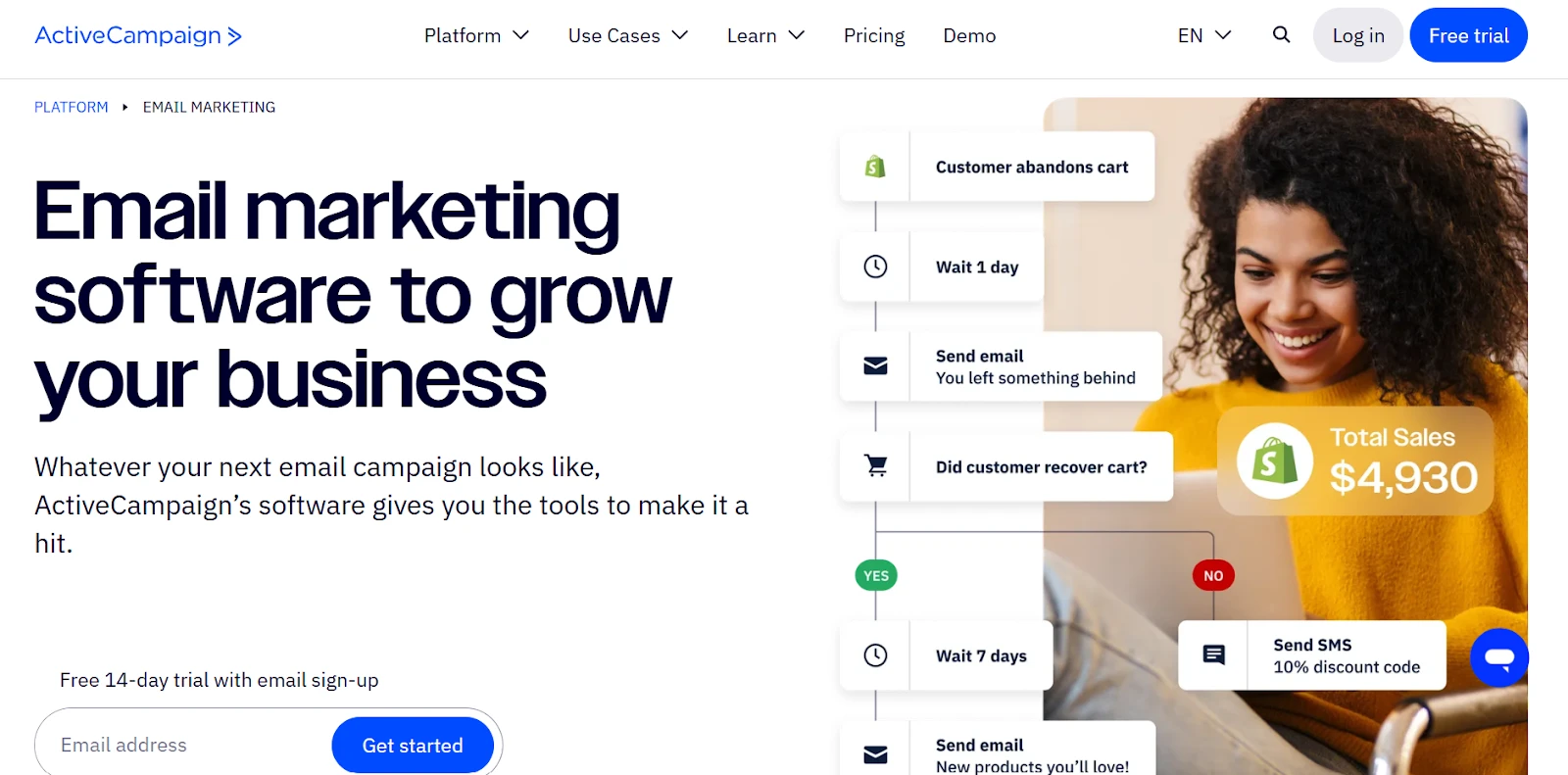
Best for: Businesses seeking enterprise-level automation on a small-business budget. ActiveCampaign’s USP is its powerful workflows and CRM integration that let you “punch above your weight” – automating cross-channel campaigns (email, SMS, WhatsApp) and lead nurturing with very granular logic.
GetResponse
GetResponse is a comprehensive marketing platform that originally focused on email but now offers a range of additional features, including webinars, funnels, and an AI-powered webinar builder. Marketed as “email marketing & automation features for marketers and content creators”, GetResponse shines with a broad feature set. Unique to GetResponse is its integrated webinar tool (host unlimited webinars, up to 1,000 attendees) – one of the first email providers to bundle webinar software. It also offers e-commerce integrations, CRM, and content monetization (course and newsletter builders).
With modern AI writing assistants and “Perfect Timing” send optimization, the platform continually adds new tools. However, the interface can feel cluttered due to the numerous options. Still, for businesses or creators who need email, webinar, and sales funnel features in one account, GetResponse remains a solid choice.
- Extensive automation tools: drag-and-drop workflow editor, Perfect Timing send optimization, web event triggers, and prebuilt automation templates for common funnels. Integrates email, SMS, and push in workflows.
- Rich template library for emails, plus funnel and landing page builders. A newsletter and webinar email templates are included. AI-powered email and copy generators assist content creation.
- Standard segmentation (e.g., custom fields, tags, behaviors). Supports dynamic content blocks and retargeting integrations (Facebook Pixel, custom audiences).
Although the platform does not offer a free tier, it does allow marketers to enjoy a 30-day trial instead. The cheapest paid plan starts at $18,60 monthly for 1,000 contacts, an AI email generator, and unlimited autoresponders.
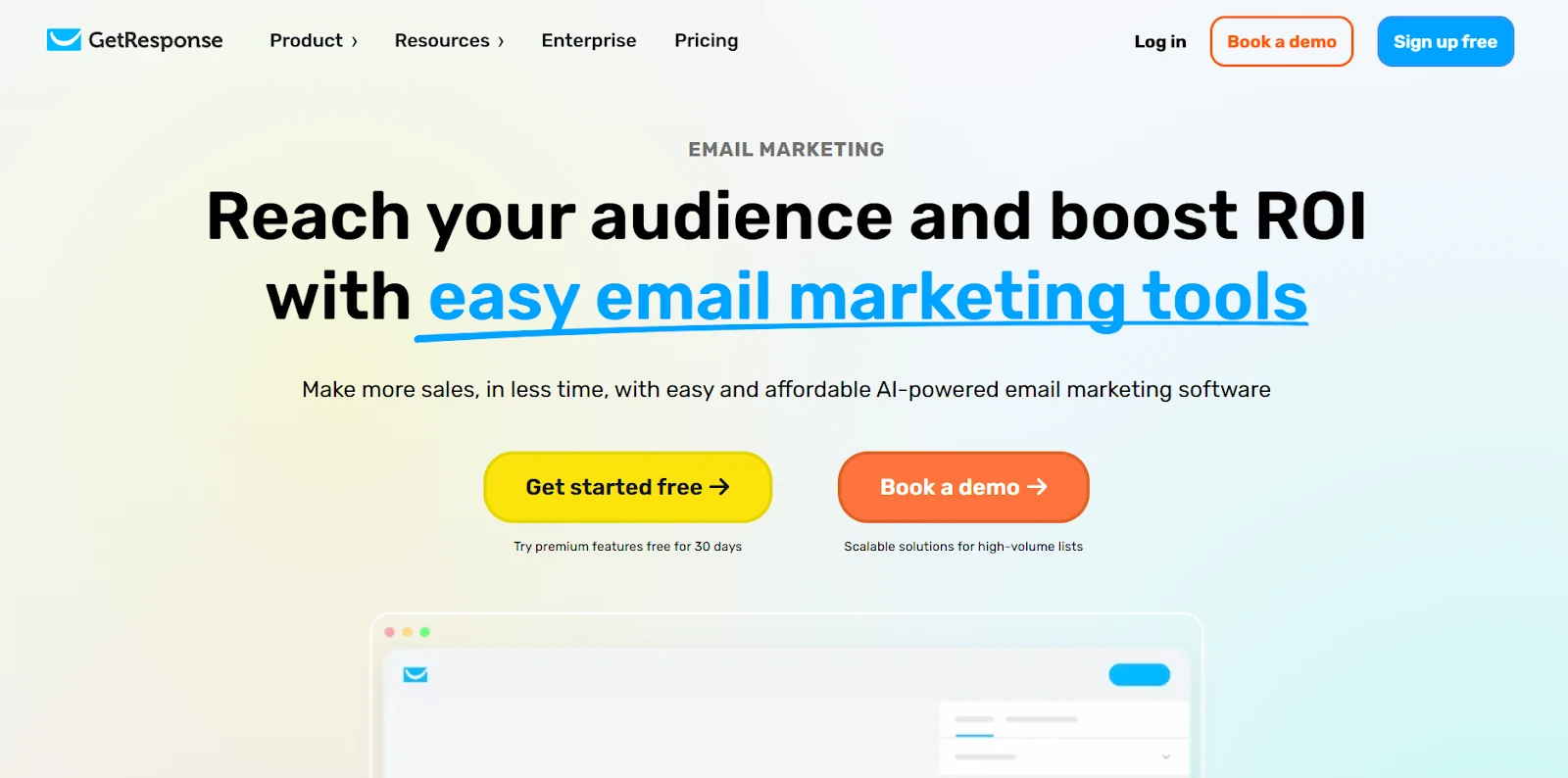
Best for: Marketers and creators who want all-in-one email + webinar marketing. GetResponse’s USP is its built-in webinar suite and AI tools, which enable you to run webinars and automate tasks from one platform. It’s especially useful if you need webinars or complex funnels in addition to email.
AWeber
AWeber is one of the oldest email marketing companies (founded in 1998) and remains a popular choice for small businesses and entrepreneurs. Its tagline is “Connect, automate, and sell your vision to the world”. AWeber excels at simplicity and reliable deliverability. Unlike more complex rivals, AWeber’s approach is straightforward: easy list building, a drag-and-drop email editor, and basic automations. It was among the first to provide email templates and autoresponders, and it maintains a high sender reputation.
Notably, AWeber also includes web push notifications (one of the few legacy platforms to do so). The platform offers 24/7 support and free migrations, which new users appreciate. If anything, AWeber is missing some modern fluff (e.g., native SMS, advanced AI). But for plain email newsletters and autoresponders, it’s rock-solid and cost-effective.
- Basic automation (“Campaigns”) and splits (if/else logic). Also provides a “Newsletter Assistant” (AI copy suggestions) and a landing page builder. Automation flows can include tagging and triggering follow-ups.
- 700+ email and landing page templates; modern drag-and-drop editor with many customization options. Easy-to-use template gallery. Also supports RSS-to-email for blogs.
- Segmentation by subscriber activity, custom fields, or tags. Includes analytics for open/click rates. Personalization via merge tags and dynamic content (New Automated Emails feature).
The tool offers a 14-day free trial for businesses to test its features. After that, they’ll have to purchase a paid plan, which starts at $15 per month for 500 subscribers, 5,000 emails, and one email list.
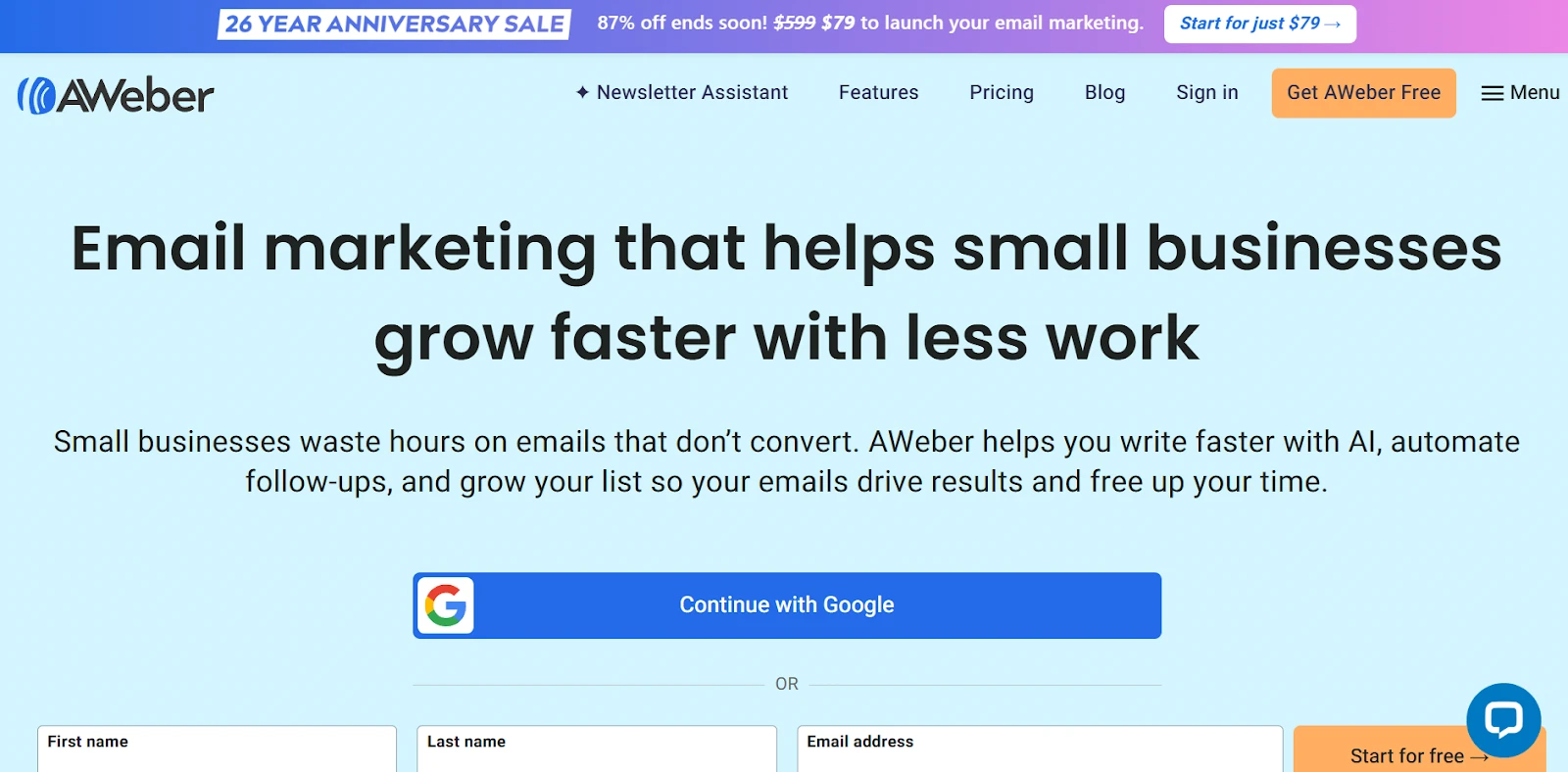
Best for: New entrepreneurs and small businesses wanting a proven, user-friendly email solution. AWeber’s USP is its emphasis on simplicity and support; it’s particularly trusted for being easy to set up with reliable deliverability.
Wrapping Up
After reviewing the top email marketing tools of 2025, one thing becomes clear: while each platform has its strengths, SendPulse delivers the most balanced and future-proof solution for businesses and marketers worldwide.
Here’s why SendPulse stands out as the best choice:
- True all-in-one ecosystem. Unlike most competitors that focus solely on email, SendPulse combines email, SMS, web push notifications, chatbots, CRM, landing pages, and even online stores into a single platform. This means you can run all your marketing campaigns without having to juggle multiple services.
- Powerful AI capabilities. From subject line optimization to full website copy generation, SendPulse’s AI assistant gives businesses a competitive edge by saving time and producing better results.
- Advanced automation made simple. The Visual Automation 360 builder makes it easy to create complex customer journeys across channels, something that often incurs additional costs or is unavailable on other platforms.
- Unmatched value for money. With a generous free plan (15,000 emails/month for up to 500 subscribers, plus chatbots and push notifications), SendPulse offers more tools upfront than most competitors’ paid plans.
- Omni-channel marketing on a budget. Whether you’re a small business owner, startup, or growing eCommerce brand, you can scale with SendPulse without needing expensive add-ons.
In short, SendPulse isn’t just another email marketing platform—it’s an integrated marketing hub designed to grow with your business. If you’re looking for a cost-effective, AI-powered, and multi-channel solution in 2025, SendPulse is the smartest choice among all the options available today.
Choosing the right email marketing platform is a big step toward building stronger customer relationships and driving growth. But email is only one part of the bigger picture — managing leads, tracking interactions, and closing deals often requires a more comprehensive system. If you’re ready to take the next step, check out our guide to the best CRM platforms, where we explore platforms that can help you organize contacts, streamline sales, and connect your marketing with long-term customer management.




